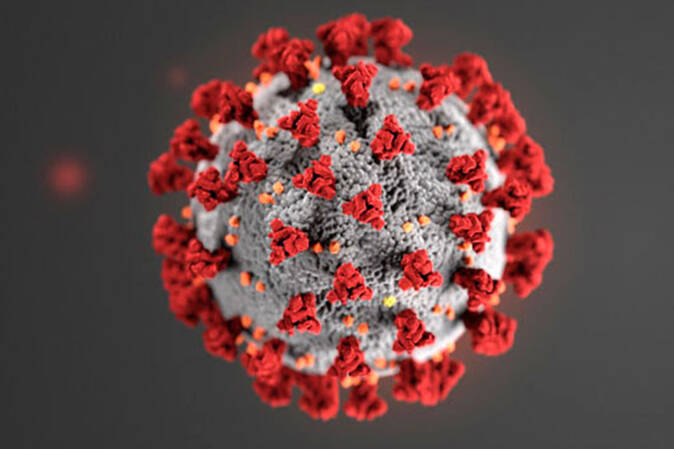The seven-day average of new COVID-19 cases is currently at an all-time high, according to state data released Wednesday.
The average number of daily cases over the past week skyrocketed to 2,099.7 per 100,000 people, which surpasses the threshold for high risk over 20 times.
And health officials said during a public science session Wednesday that it’s likely COVID cases are being underreported.
“I just want to recognize that we’ve never been able to identify all the COVID cases,” Chief Medical Officer Dr. Anne Zink said Wednesday.
She said there have always been limitations to state data — including people who opt not to test and asymptomatic cases — and that the availability of at-home testing is likely increasing the reporting limitations.
The state Department of Health and Social Services on Wednesday reported 10,202 new COVID cases sequenced from Jan. 14 through Jan. 18, as well as 64 more deaths from the virus.
The newly reported deaths bring the total to 1,018 deaths since the pandemic began. Of the 64 recently reported deaths, seven were Kenai Peninsula residents.
New cases reported Wednesday included 166 in Homer, 120 in Kenai, 110 in Soldotna, 61 in the Kenai Peninsula Borough South, 29 in Anchor Point, 24 in the Kenai Peninsula Borough North, 17 in Seward, 13 in Sterling, eight in Nikiski and three in Fritz Creek.
The omicron variant has been causing an overwhelming majority of new infections.
Jayme Parker, the section chief of the Alaska public health laboratories, said during the session Wednesday that during the Christmas holiday about 53% of new COVID cases being sequenced were omicron and delta. By the New Year’s holiday that increased to about 77% omicron, and as of a week and half ago, 91% of new cases in the state were due to the omicron variant.
Because many omicron cases have reportedly been less symptomatic, and because of the increasing availability of at-home COVID test kits, state officials with the DHSS are encouraging people to use hospitalizations and death metrics to determine the severity of the state’s COVID spread.
There were a total of 126 COVID-related hospitalizations in Alaska as of Wednesday, with five of those patients on ventilators. A week prior, on Jan. 12, there were 87 COVID hospitalizations with eight patients on ventilators.
Bruce Richards, the external affairs director at Central Peninsula Hospital in Soldotna, said Wednesday that the facility is “okay with regard to hospital bed capacity in spite of record high numbers and community transmission rates.”
While the hospital inpatient census hasn’t spiked as fast as new cases, Richards said, the facility is currently experiencing high levels of quarantined and COVID-positive employees.
Health experts widely agree getting vaccinated against COVID will help slow the spread and protect people from severe illness, hospitalization and death.
The Pfizer-BioNTech vaccine is approved for everyone 5 years and older, while the Moderna and Johnson & Johnson/Janssen vaccines are approved for anyone 18 and older.
In addition to a primary series — two doses of the Pfizer or Moderna vaccine or one dose of the Janssen vaccine — experts are strongly encouraging booster shots to protect against omicron.
Health officials said studies indicate a person with their primary series is expected to be about 35% protected against omicron, or 75% protected with a booster dose.
The Food and Drug Administration and Centers for Disease Control and Prevention are recommending Pfizer boosters for anyone 12 and older at least five months after the primary series. Additionally, Moderna boosters are recommended for anyone 18 and older at least six months after a primary series.
Janssen boosters are approved for anyone 18 and older at least two months after initial vaccination, although the FDA announced it was revising its fact sheet for the Janssen shot to include more data on the risks of blood clotting associated with the vaccine.
According to the DHSS Facebook page, the state is recommending people with a primary Janssen vaccine to get either a Pfizer or Moderna booster for more robust protection.
Getting a vaccine
COVID-19 vaccines do not cost money.
Many organizations on the central peninsula — including Walmart, Walgreens, the Kenai Fire Department and Kenai Public Health — offer vaccines.
Additionally, Soldotna Professional Pharmacy hosts a walk-in clinic in its strip mall storefront at the “Y” intersection of the Sterling and Kenai Spur highways. The clinic is open from noon to 6 p.m. Monday through Friday and 10 a.m. to 2 p.m. on Saturday.
Vaccination appointments can also be scheduled through the online portal PrepMod, which can be accessed at myhealth.alaska.gov.
A map of vaccine providers can be found on DHSS’ COVID-19 vaccine website at covidvax.alaska.gov.
People who would like assistance scheduling a vaccination appointment can call the Kenai Peninsula Borough Office of Emergency Management call center. The center operates Monday through Friday from 9 a.m. to noon. The central peninsula call center can be reached at 907-262-4636. The Homer call center can be reached at 907-235-4636. The Seward call center can be reached at 907-224-4636.
Testing locations
Officials encourage anyone with symptoms to test for COVID-19, despite vaccination status.
In Kenai, testing is available at Odyssey Family Practice, Kenai Public Health Center and Capstone Clinic. At-home test kits are also available for free at Kenai Public Health.
In Soldotna, testing is available at the Peninsula Community Health Center, Urgent Care of Soldotna, Walgreens and Soldotna Professional Pharmacy.
In Seward, testing is available at Providence Medical Center, Chugachmiut-North Star Health Clinic, Glacier Family Medicine, Seward Community Health Center and the Safeway pharmacy.

